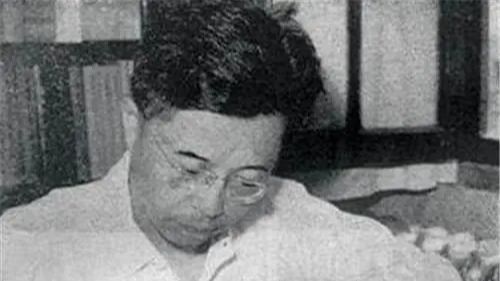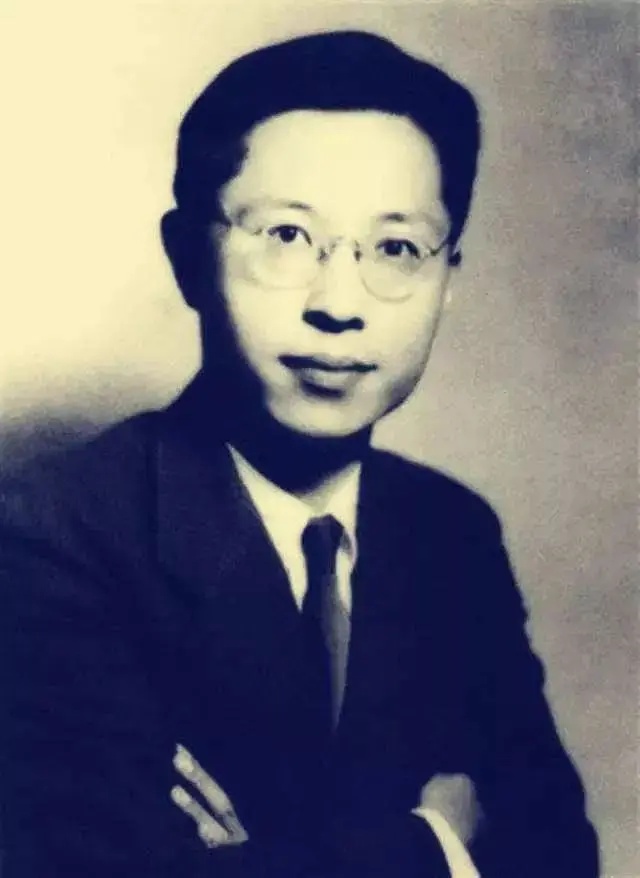
Young Cao Yu photo
Famous playwright Cao Yu (original name Wan Jiabao), originally from Qianjiang, Hubei, was born in Tianjin's Xiaobailou. Shortly after his birth, he moved to 28 Erma Road in the Italian concession, now at 23 Minzhu Road in Hebei District, where the two Italian-style villas are located, which is now the Cao Yu Memorial Museum. From childhood to adolescence, until 1929 when he left Tianjin for Beijing to continue his studies at Tsinghua University, transferring from the political science department of Nankai University to the Western Literature department, he could never sever his emotional ties to his hometown.
The Cao Yu Memorial Museum consists of two two-story brick-wood structures facing east and west. The front building now serves as a memorial hall displaying some pictures and documents, while the back building contains some furniture, showcasing the daily life of the former residence. In the nearly 912 square meters of the two small villas, a large number of historical documents and nearly 3,000 precious photos from the collection are displayed, along with over 50 pieces of restored furniture and more than 40 other valuable cultural relics. It vividly recreates the family environment, social circle, cultural influences, and social background of Cao Yu during his time in Tianjin.
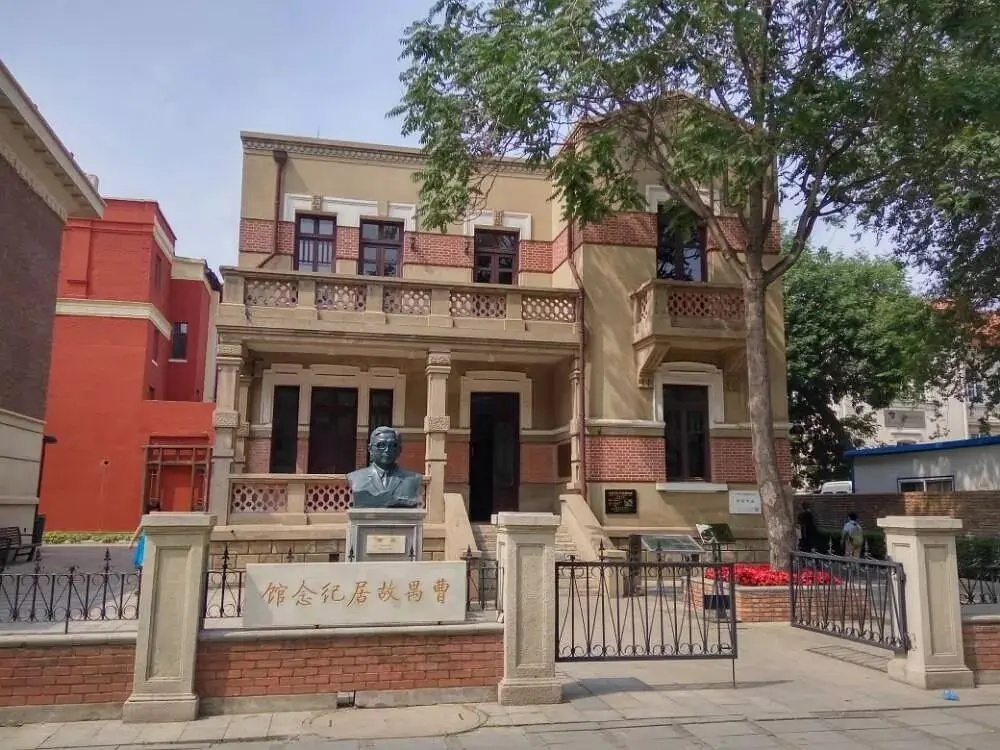
Cao Yu Memorial Museum, 23 Minzhu Road, Hebei District, Tianjin.
Upon entering, the first thing that catches the eye is a 1.2-meter tall bronze bust of Cao Yu created by sculptor Liu Xin, placed in the courtyard. Cao Yu's former residence is divided into a front building and a back building, both ordinary European-style villas. The front building is of brick-wood structure, with a sloped tile roof, cement walls, and wooden doors and windows. The front of the building has two balconies of different sizes, with a honeycomb perspective wall on the balcony. The entrance features a square hall with brick columns on both sides. The entire building is simple and unadorned, convenient for living. Each room in the building mainly introduces Cao Yu's "family genealogy," "Cao Yu's life," his experiences in the Nankai New Drama Troupe, photos from performances, and his interactions with educators Zhang Boling and Zhang Pengchun; additionally, there are versions of "Sunrise," performance booklets from various troupes of "Thunderstorm," as well as his manuscripts and performance reports.
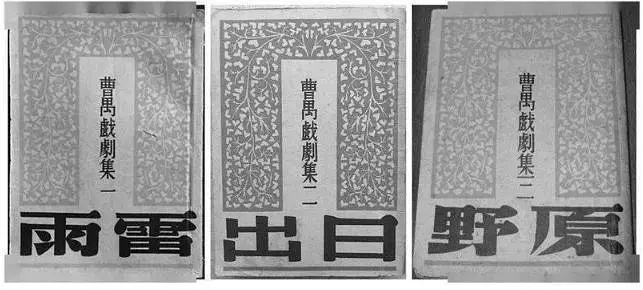
Cao Yu's "Life Trilogy": "Thunderstorm," "Sunrise," "The Wilderness"
Cao Yu's father, Wan Dezun, was known as a "child prodigy." He studied at the Two Lakes Academy and in 1904 was awarded a government scholarship to study in Japan, attending the Japanese Army Officer School in Tokyo, where he was classmates with warlord Yan Xishan. He returned to China in 1909 and was appreciated by the governor of Zhili, Duan Fang, who appointed him as the standard bearer of the Zhili Guard. After the establishment of the Republic of China, he became a secretary to President Li Yuanhong and rose to the rank of lieutenant general in the army. During this time, he served as the garrison commander in the military stronghold of Xuanhua. Following Li Yuanhong's resignation, he abandoned his official position and retreated to Tianjin, becoming idle at home and falling into despair.
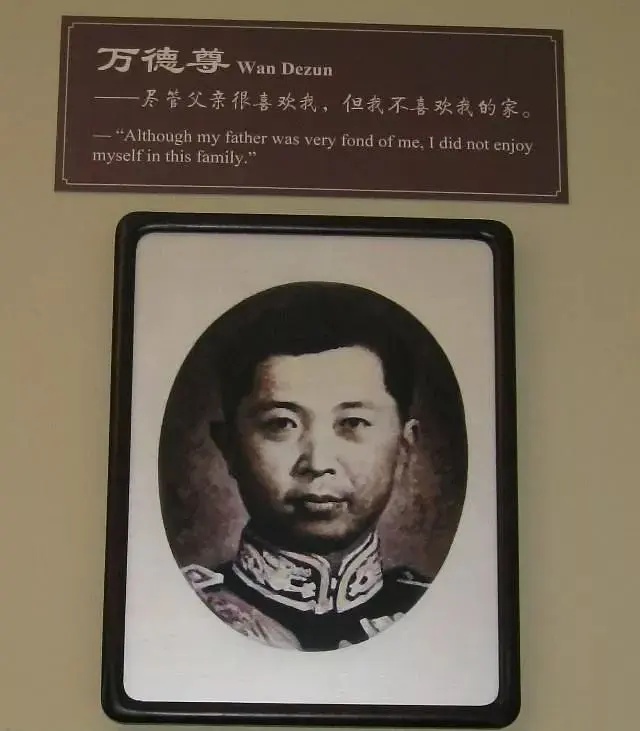
Portrait of Cao Yu's father, Wan Dezun, in military uniform
Cao Yu's biological mother, Xue, passed away three days after giving birth to him due to puerperal fever. His stepmother was his biological mother's twin sister, Xue Yongnan. At the age of three, Cao Yu began watching plays with his stepmother, planting the seeds of drama in him from a young age. Although his stepmother treated Cao Yu as her own flesh and blood, the pain of losing his biological mother accompanied him throughout his life, leading to feelings of depression and frustration. His father's distress and the oppressive atmosphere of the family contributed to this. Wan Dezun's unfulfilled ambition to bring glory to his family caused him extreme mental anguish, creating a stifling atmosphere at home that naturally affected Cao Yu's mood and emotions. However, it was this family and this small villa that became the place where his dramatic talent was nurtured, which also infused his later works with a rich tragic color.
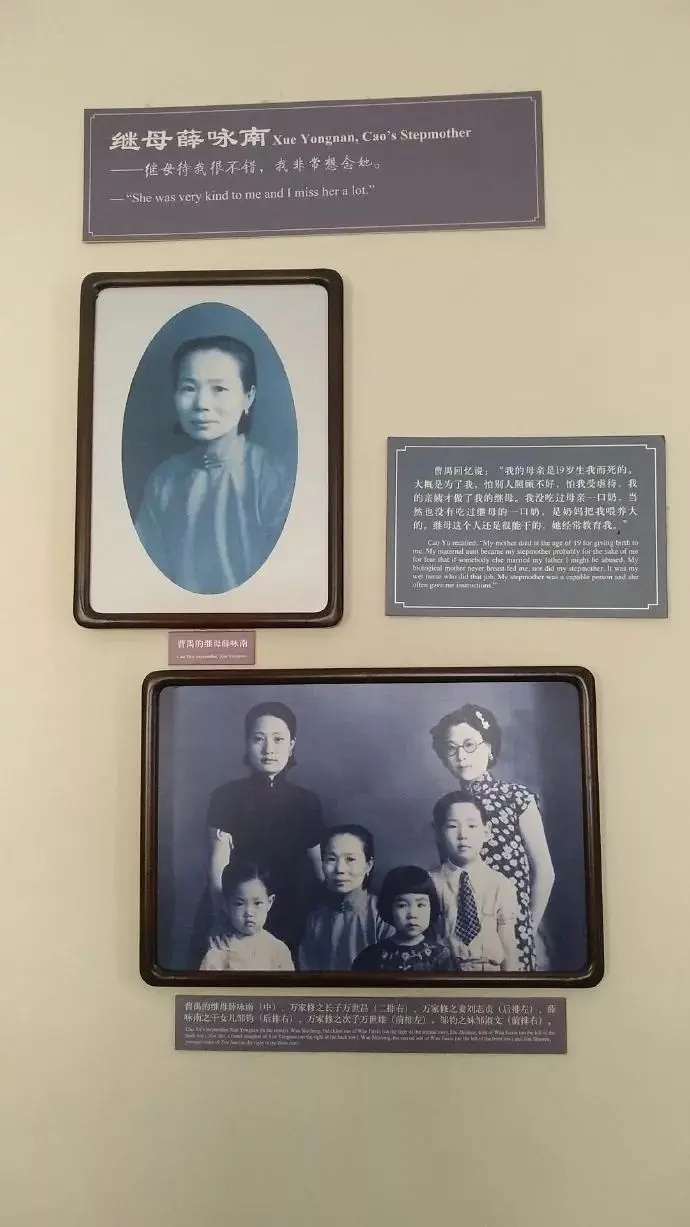
Cao Yu's stepmother, Xue Yongnan, learned of her sister's death three days after Cao Yu was born and offered to take care of the newborn Cao Yu.
At the age of 13, Cao Yu was admitted to the private Nankai School in Tianjin, where Principal Zhang Boling placed great emphasis on the cultivation of students' character, promoting drama activities as an important extracurricular activity. At Nankai, Cao Yu also met a person who would become extremely important in his life—Zhang Pengchun, the brother of Principal Zhang Boling. Zhang Pengchun studied education and drama at Columbia and Yale in the United States, directly transplanting Western drama theory to the Nankai New Drama Troupe.
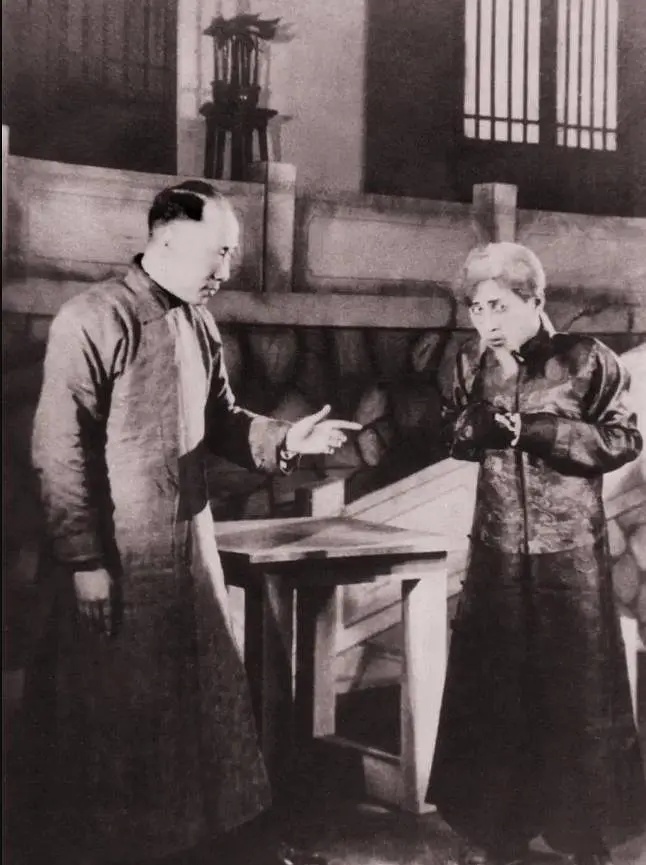
Rehearsal scene of "The Madman," with Zhang Pengchun explaining the play to Cao Yu. Cao Yu is on the far right.
Zhang Pengchun discovered Cao Yu's talent for dramatic performance. Cao Yu became a key member of the Nankai New Drama Troupe. Initially, he served as an actor, often playing female roles. He successfully portrayed the female lead, Petra, in Ibsen's famous play "An Enemy of the People," and the female lead, Nora, in "A Doll's House," garnering widespread attention and acclaim in the cultural and educational circles. Under Zhang Pengchun's guidance and encouragement, Cao Yu began to venture into playwriting, adapting the British playwright Galsworthy's "The Forsyte Saga" and translating the problem plays "Winter Night" and "Madame."
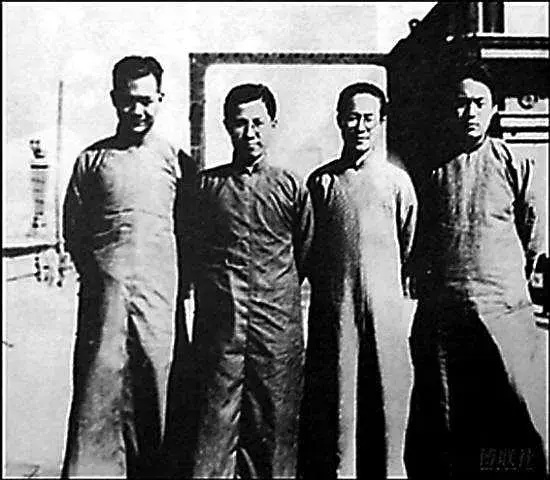
From left to right: Xiao Qian, Cao Yu, Shen Congwen, Jin Yi (mid-1930s)
In 1933, at the Tsinghua University Library, 23-year-old Cao Yu completed the four-act play "Thunderstorm," which was performed by the Gulong Troupe of Tianjin Normal School in August 1935, receiving an extremely strong response. Subsequently, many troupes across the country staged it, causing a stir in the drama community. Shortly thereafter, while teaching at Tianjin Women's Normal School, he wrote "Sunrise," followed by "The Wilderness," "Transformation," "Beijinger," and "Family," which were successively published.
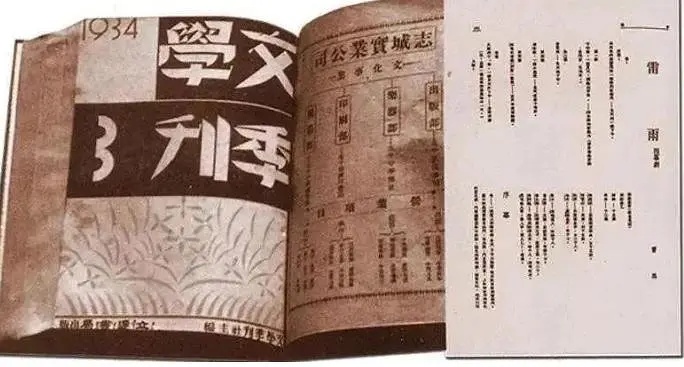
Publication of "Thunderstorm" in the "Literary Quarterly"
"Thunderstorm" is a play written by Cao Yu, published in July 1934 in the "Literary Quarterly." The play is set against the backdrop of Chinese society around 1925 and depicts the tragedy of a bourgeois family with strong feudal characteristics. The story revolves around two families, eight characters, and thirty years of grudges, featuring the hypocritical capitalist Zhou Puyuan, the naive youth Zhou Chong influenced by new ideas, the woman Fan Yi driven mad by a cold family and hurt by love, Zhou Ping filled with guilt over past actions and seeking to escape, the unexpectedly returning Lu Shiping, the innocent Lu Sifeng who loves and is loved, the oppressed worker Lu Dahai, and the greedy housekeeper. Whether it is family secrets or personal histories, all conflicts erupt on the night of the thunderstorm, narrating the entangled family conflicts and denouncing the decay and stubbornness of feudal families while reflecting deeper social and historical issues.
Cao Yu Memorial Museum, the dramatic career of young Cao Yu
In 1935, he adapted Molière's "The Miser" into the Chinese version "The Madman," taking on the lead role, which caused a sensation. Cao Yu also adapted and directed British playwright Oscar Wilde's "Lady Windermere's Fan," among others, and participated in the creation of "New Village Justice." These works not only established Cao Yu's position in the history of Chinese drama but also marked the maturation of Chinese spoken drama. Cao Yu's experiences in Tianjin are richly presented in the exhibition, allowing for a detailed understanding of his family background and dramatic career.
To create the play "Sunrise," Cao Yu, accompanied by friends, investigated third-class brothels and herbal medicine shops in Tianjin at the time, discovering lower-class women like Cui Xi, who had "hearts of gold."
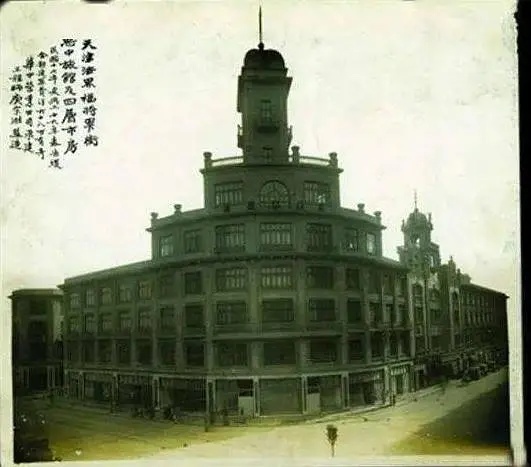
The picture shows an old photo of the Huizhong Hotel in Tianjin. "Sunrise" tells the tragic life stories of characters from different social classes and types, depicting the harshness of society and the helplessness of reality. "This play was formed in Tianjin, and the place names are all real, so the audience is both familiar and curious. Plus, Mr. Cao Yu is from Tianjin, creating a wonderful collision." The events described in the script can be traced back to real locations in Tianjin, such as the Huizhong Hotel in the bustling area of Quanye Market, and the old site of Cuibai Village on Qinghe Street, which has become untraceable with the passage of time.
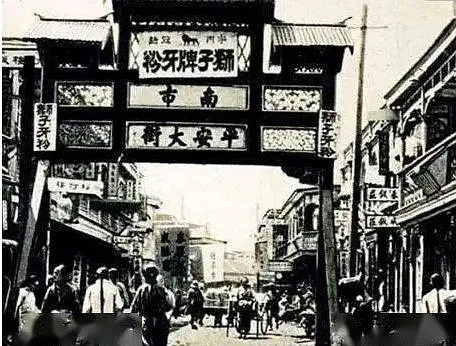
Old photo of Tianjin's "Sanbu Guan" area
